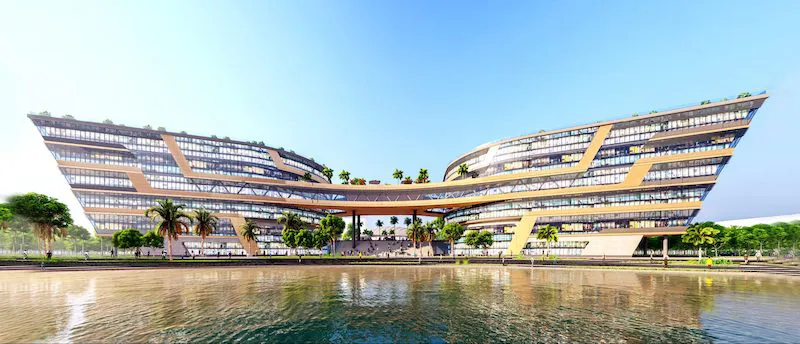Red River Delta to be home to Center for Entrepreneurship and Innovation
Localities in the region will increase funding for basic research and the training of high-quality human resources.
Vietnam will build an entrepreneurship and innovation center in the Red River Delta region, which is expected to create breakthroughs in the development of science, technology and innovation in the region.
The proposal was made by Minister of Science and Technology Huynh Thanh Dat at a meeting in Hanoi this week.
| The National Center for Innovation at the Hoa Lac High Tech Park, Hanoi. Photo: NIC |
He said the Ministry of Science and Technology is working with other ministries to build three national entrepreneurship and innovation centers in the north, central, and south regions.
The Red River Delta region, renowned for its vast potential in science, technology, and innovation, accommodates over 50% of the country's research and development organizations. It boasts more than 150 universities, 14 out of 17 national key laboratories, and over 500 public and private science and technology establishments, along with technology and equipment trading platforms.
Furthermore, the area houses numerous large economic enterprises engaged in high-tech industrial and agricultural projects. The existence of high-tech industrial parks and advanced agricultural applications accelerates the integration of scientific and technological advancements into production.
Currently, five provinces in the Red River Delta region operate technology equipment trading floors - Haiphong, Nam Dinh, Ninh Binh, Thai Binh, and Quang Ninh - which were amalgamated into a network as of June 2019. Moreover, Hanoi will inaugurate a technology equipment and trading floor in the third quarter of 2023, alongside the existing one operated by the Ministry of Science and Technology (National Agency for Science and Technology Information) in the city.
The minister emphasized the importance of developing innovation, entrepreneurship, and artificial intelligence centers in Hanoi, Haiphong, and Ha Nam. Hanoi will be designated as the hub for innovation, research, development, and technology transfer, anchored by the Hoa Lac High-Tech Park, research institutes, and universities. Haiphong will take on the role of an international center for marine science and technology education, research, and application.
The minister added that, in terms of investment and development solutions, it is also important to focus on developing high-tech industrial parks and high-tech agricultural application areas. The Hoa Lac High-Tech Park in Hanoi is currently a model for other regional localities to follow.
The northern province of Ha Nam plans to build a high-tech industrial park focusing on artificial intelligence, electronic semiconductors, automation, biotechnology and medicine, and new materials technology.
"The establishment of efficient high-tech agricultural areas based on the application of advanced technology, following the planning in the provinces and cities in the region, such as Hanoi, Haiphong, Quang Ninh, Nam Dinh, Vinh Phuc, Bac Ninh, Hai Duong, and Hung Yen, is also necessary," the minister said.
Another important solution is to mobilize social resources for investment in high-tech industrial parks and agricultural application areas, given the constraints of the State budget, Minister Huynh Thanh Dat stressed.
The Red River Delta region needs to tap into its scientific and technological potential to promote basic research activities, especially those focusing on innovation, autonomy, and competitiveness in key areas.
The Ministry of Science and Technology urged the provinces in the region to increase funding for basic research and to train high-quality human resources.
In the last six months of 2023, the Ministry of Science and Technology will submit a decree on high-tech industrial parks to the Prime Minister for approval, including content related to attracting social capital for developing high-tech industrial parks.
Dat requested the Red River Delta Coordination Council to consider formulating a plan for establishing an innovation and entrepreneurship center in the region. This solution was mentioned in a resolution concerning the development of the Red River Delta region's economic and social progress, as well as its national defense and security, by 2030, with a vision extending to 2045.
On July 11, Prime Minister Pham Minh Chinh signed a decision to establish the Red River Delta Region Coordination Council, with him as the chairman. The primary objective of this council is to revamp the region's coordination mechanism, promote sustainable economic and social development, safeguard the environment, and ensure national defense and security.
The Red River Delta Region encompasses 11 provinces and cities, namely Hanoi, Haiphong, Quang Ninh, Vinh Phuc, Bac Ninh, Hai Duong, Hung Yen, Thai Binh, Ha Nam, Nam Dinh, and Ninh Binh.












